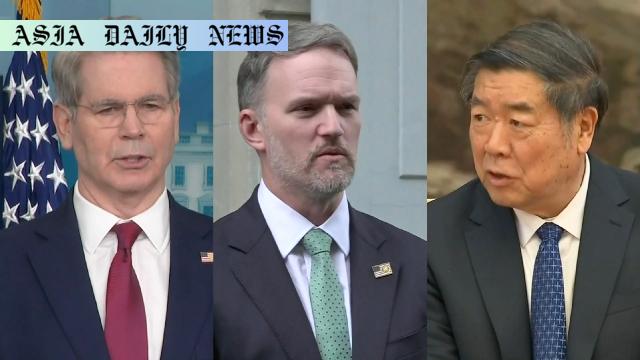Trade Talks: Substantial progress made by US & China with a joint statement due Monday.
Negotiators from the US and China have reportedly made substantial progress in trade talks.
High-ranking officials, including China’s Vice Premier and US Treasury Secretary, participated.
Both sides agreed to establish an economic and trade consultation mechanism.
A joint statement regarding the agreements will be released on Monday.

US and China Achieve Substantial Progress in Trade Negotiations
The recent trade discussions between the United States and China have yielded significant advancements, creating optimism about the resolution of ongoing economic tensions. These talks, held in Geneva, Switzerland, brought together influential figures such as US Treasury Secretary Scott Bessent, US Trade Representative Jamieson Greer, and China’s Vice Premier He Lifeng. After two days of intensive deliberations, all sides expressed their optimism about the results and agreed to release a detailed joint statement on Monday.
The Context of the Trade Dispute
The trade tensions between the two economic powerhouses have been escalating over the last month due to the imposition of reciprocal tariffs. Both countries placed significant levies—some exceeding 100%—on each other’s goods, marking a sharp turn in their trade relations. The US, under President Trump’s administration, justified these tariffs as measures to correct imbalances and ensure fairer trade practices. However, China’s government has maintained its position of not easily compromising, showcasing a firm stance in its negotiations.
This weekend’s meeting was a pivotal one, as it marked the first official dialogue between senior officials since the recent tariffs came into effect. Participants on both sides positively reflected on the constructive nature of these talks. Jamieson Greer noted how quickly the parties reached agreements, suggesting that initial disparities may not have been as insurmountable as previously perceived.
Key Outcomes of the Geneva Talks
Among the significant advancements made over the weekend was the decision to establish an economic and trade consultation mechanism. This framework aims to facilitate smoother communication and collaboration on future economic matters, reducing the likelihood of similar trade disputes. Additionally, the delegations reached essential consensus points that reflect commitment from both nations to find mutually agreeable solutions.
While specific details of these agreements remain under wraps until the official announcement, the tone from both sides has been notably optimistic. Vice Premier He Lifeng affirmed that substantive progress was achieved during the discussions, reflecting a tangible step toward resolving tensions. Meanwhile, President Trump also hinted last week that the additional duties on Chinese goods might be alleviated based on the negotiation outcomes.
The Impact of Trade Disputes on Global Economy
Trade tensions between the US and China have far-reaching consequences for the global economy. As the world’s largest economies, their economic policies significantly influence global trade flow, investment opportunities, and market stability. Prolonged disputes can lead to disruptions in supply chains, increased costs for businesses, and reduced consumer confidence. Economists worldwide have been closely watching these negotiations, emphasizing the importance of reaching sustainable solutions.
The establishment of a trade consultation mechanism is a promising step in mitigating future conflicts. Experts highlight the value of transparency, consistent dialogue, and mutual trust in ensuring healthy trade relations between these two nations. The outcome of these Geneva talks not only holds significance for the US and China but also sets a precedent for resolving trade disputes through diplomacy and collaboration.
Looking Forward
As the world anticipates the joint statement to be released on Monday, all eyes remain on the unfolding developments. If the commitments expressed during this dialogue translate into actionable policies, it could mark a turning point in US-China trade relations. More importantly, it could pave the way for a stabilized global economy and renewed international cooperation amidst rising protectionism worldwide.
Ultimately, the results of these discussions—and their implementation—will be a critical test of the willingness and ability of both nations to rise above differences and work towards a genuinely collaborative economic future. Observers will closely monitor whether the progress made in Geneva can sustain the momentum necessary to resolve deeper underlying issues, ensuring long-term growth and stability for both nations and the world at large.



Commentary
A Critical Moment in US-China Relations
The recent trade discussions between the United States and China mark a defining moment in the ongoing efforts to recalibrate the relationship between the world’s two largest economies. After months of heightened tensions and reciprocal tariffs that threatened global economic stability, the Geneva talks offered a ray of hope. If handled correctly, the outcomes of these negotiations could set a precedent for resolving complex economic disputes through meaningful dialogue and cooperation.
The Importance of Collaboration
In a world where economies are increasingly interdependent, conflicts between major nations such as the US and China can have cascading effects. The imposition of steep tariffs did not merely affect these two countries but also disrupted global supply chains and created uncertainties in international markets. While China’s firm stance and the US’s protectionist policies initially appeared insurmountable, the Geneva talks demonstrate that diplomacy still has the potential to bridge divides. Establishing a consultation mechanism is a significant step toward fostering a spirit of collaboration in addressing future trade challenges.
Hope for a More Stable Global Economy
As the details of the agreements are awaited, the optimism conveyed by participants in the Geneva talks is encouraging. However, it also serves as a reminder that genuine partnership requires sustained effort beyond symbolic gestures. Both nations must now focus on implementing the terms of their consensus in good faith. By doing so, they can not only resolve current disputes but also create a foundation for a more stable and cooperative global economic future. The world is watching closely, and the stakes could not be higher.